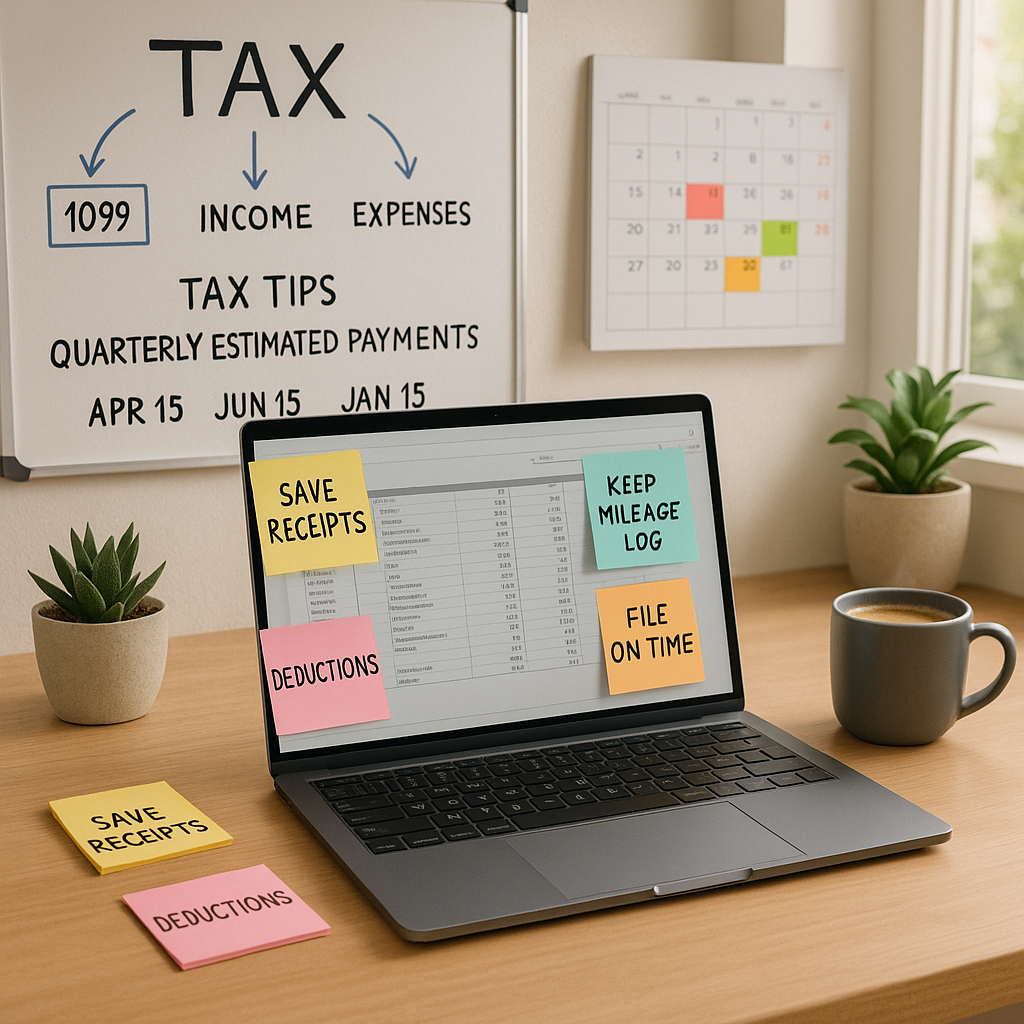1099 Tax Tips: How Gig Workers Can Maximize Deductions

1099 Tax Tips: How Gig Workers Can Maximize Deductions
The gig economy offers flexibility and independence, but it also comes with unique tax responsibilities. If you earn income as a freelancer, rideshare driver, or through any gig platform, you’re considered self-employed for tax purposes. That means you’re responsible for reporting all income and paying both income tax and self-employment tax. Here’s how to stay compliant and keep more of your hard-earned money in 2025.
-
Report All Income—Even Without a 1099
Gig workers must report all taxable income, even if not reported on a 1099-NEC or 1099-K. Most won’t get a 1099-MISC for core gig work, but may receive one for rental income, royalties, or awards. Typically, 1099-MISC amounts are reported as “other income” unless they’re business-related, in which case report them on Schedule C. Keep thorough records—don’t rely solely on tax forms to capture all earnings.Tax Tip: Keep a detailed log of all payments from clients or platforms. Don’t rely solely on 1099 forms—they may not capture everything.
Understand Self-Employment Tax
In addition to income tax, gig workers pay self-employment tax, which covers Social Security and Medicare. The rate is 15.3% on net earnings (after expenses). You can deduct half of your self-employment tax when calculating your adjusted gross income.Tax Tip: Use Schedule SE with your Form 1040 to calculate self-employment tax accurately.
Track Deductible Expenses
You can deduct ordinary and necessary business expenses to lower your taxable income. These expenses must be directly related to your work and typical for your industry. For gig workers, common deductions include:
-
● Mileage or actual vehicle expenses: Deduct either the standard mileage rate or your actual car expenses for business travel, like driving for rideshare or deliveries.
● Home office costs: If you use a dedicated area of your home regularly and exclusively for work, you can deduct a portion of rent, mortgage interest, utilities, insurance, and repairs.
● Phone and internet bills: Deduct the percentage of your phone and internet costs used for business.
● Supplies, software, and equipment: This covers items like office supplies, laptops, or work-related software—anything you need to stay productive and connected.
● Marketing and advertising costs: Expenses for promoting your business, such as website fees, ads, or business cards, are all deductible.
-
Other possible deductions include business insurance, education and training, professional services (such as tax prep or bookkeeping), and even certain travel and meal expenses when they directly support your business.
-
Tax Tip: Always keep receipts and track all expenses with a digital tool or expense app. Good records will help you maximize your deductions and make IRS compliance much easier at tax time.
Choose Your Payment Methods Wisely (to Avoid IRS Mismatches)
How you accept payments affects what the IRS sees—and what shows up on your 1099 forms:- Payment cards and digital wallets (Apple Pay, Google Pay): Digital wallets are not payment processors; they pass card details to your processor (e.g., Stripe, Square). If used through a processor, these transactions are treated as card payments and included in 1099-K reporting.
- Peer-to-peer use without a processor: If Apple Pay or similar wallets are used without a processor, those transactions are not included in 1099-K reporting—but the income is still taxable and must be reported.
- Payment apps/marketplaces (PayPal, Venmo, Etsy): For 2024, the threshold is $5,000. For 2025, it drops to $2,500. The IRS plans to lower it to $600 in future years (likely 2026).
- Bank-to-bank transfers (e.g., Zelle®): Zelle® does not issue 1099-K because it’s not a third-party settlement organization. However, the income is still taxable and must be reported.
Why this matters: Your return could raise questions with the IRS if records don’t match, even if you reported everything correctly. -
Compliance Tip: To help ensure accurate tax reporting and maximize your deductions, consider minimizing the use of direct bank transfers or peer-to-peer payment apps for receiving business income. Whenever possible, opt for payment processors that generate clear transaction records and issue Form 1099-K, which can simplify your year-end reconciliation and support your reported income. If you do accept payments through bank transfers or peer-to-peer platforms, be diligent about maintaining thorough documentation—such as client agreements, invoices, and records of services provided—to substantiate your income and support your tax filings in the event of an IRS inquiry.
-
Tax Tip: Monitor IRS announcements for threshold changes and reconcile 1099-K totals to your accounting records before filing. Always report all income, even if you don’t receive a form.
Pay Quarterly Estimated Taxes
If you expect to owe $1,000 or more in taxes, you must make quarterly estimated payments using Form 1040-ES. These payments cover both income and self-employment taxes. Missing deadlines can result in penalties.Tax Tip: Mark your calendar for the quarterly due dates: April 15, June 15, September 15, and January 15 of the following year.
Plan for Retirement and Health Insurance
Gig workers don’t have employer-sponsored benefits, but you can still save on taxes by contributing to:- SEP IRA or Solo 401(k): Deductible retirement contributions
- Health Insurance Premiums: Deductible if you’re self-employed and not eligible for employer coverage
Tax Tip: These deductions can significantly reduce your taxable income while helping you plan for the future.
Final Thoughts
Being your own boss means taking charge of your taxes. With organized records, smart payment choices, timely estimated payments, and the right deductions, you can stay compliant and save money. -
-
Schedule a Consultation
-
Want to make sure you’re taking advantage of every opportunity?Our team at AllTax Accounting is here to help you stay compliant and keep more of what you earn.👉 Click below to schedule a consultation.
Date
Authors
Summer BlakeCategories
- Tax Planning (12)
- Tax Law (9)
- Tax Deductions (8)
- Business Insights (7)
- Tax tips (7)
- OBBBA (6)
- Business Tax Tips (5)
- Business Tips (4)
- 2025 Tax Reform (3)
- State Tax Law (3)
- Tax Credits (3)
- Tax Deadlines (3)
- 1099 Reporting (2)
- 2025 Tax Rates (2)
- Bookkeeping (2)
- Gig workers (2)
- Recordkeeping (2)
- 2026 Tax Reform (1)
- Business Deductions (1)
- Home office (1)
- Investments (1)
- Maryland Tax Legislation (1)
- Penalties (1)
- QuickBooks (1)
- Real Estate (1)
- Retirement (1)
- Tax Rates (1)
- Tip Income (1)
- Trusts and Estates (1)
- Vehicle Deduction (1)
- W-2 Reporting (1)
- s-corp (1)










